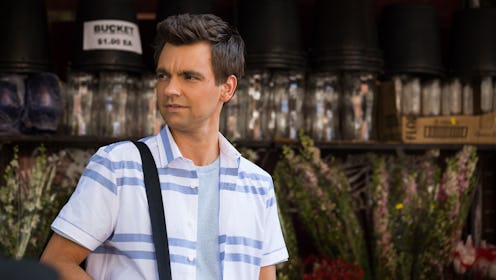Entertainment
The "Gay Brother" Song On 'The Other Two' Shows Exactly Why Queerbaiting Is Damaging

Spoilers ahead for The Other Two Season 1, Episode 4. Since its premiere in January, The Other Two has proven to be a sharp, hilarious Hollywood satire, and the Feb. 14 episode is no exception. Chase's "Gay Brother" song is, in his eyes, a well-intentioned celebration of his brother, but the show does well to expose how appealing to the LGBTQ+ community can also tokenize those within it — even if inadvertently.
Ariana Grande, Nick Jonas, Macklemore, and Katy Perry are all examples of straight musicians who have been hailed as gay allies but also accused of pandering. Perry's "I Kissed A Girl" song and Grande's "Break Up With Your Girlfriend, I'm Bored" video, for example, both seek to normalize same-sex relationships, but can be seen as disingenuous when considering the source. Yes, they raise visibility for LGBTQ+ community, but they can also come across as queerbaiting — merely a way to attract LGBTQ+ viewers or drum up shock value for personal gain.
In The Other Two, Chase isn't trying to use his brother as a ploy to build his platform. He is, after all, a child that is just trying to show his brother that while others may not accept him, he does. However, his label spins his "Gay Brother" song as a chance to cater to a gay fan base, going back and forth about whether to keep the video up after receiving criticism from the queer community (which is bad for the label), then criticism from Tomi Lahren (which is good for the label). They eventually deem the video "camp" and decide to roll with it, informing Cary that he'll have to settle for being mocked for being the subject of a desperate appeal to queer audiences for the rest of his life.
Over the course of the episode, Cary finds that the song does bring about some positive change. He meets someone who finds the courage to come out to their parents after seeing the music video, and that helps Cary find the strength to stop having shame-filled hook ups with his straight roommate. Still, the episode ends with a cringeworthy sequence of events that shows exactly why treating queerness as a trend or marketing strategy is problematic. After running into an acquaintance at a gay bar who asks him out for drinks, Cary asks why the acquaintance never asked him out before. The acquaintance says he never knew Cary was gay, and Cary's response is "thank you."
Chase's label treats Cary's identity as a prop in Chase's career, like he's someone to be pitied for not being accepted and the subject of something "sad," as the label puts it. So when Cary hears that he didn't appear openly gay, his response is "thank you" because it implies he "passed" as straight, and thus fit what society has deemed "normal." Unfortunately, the response reads as someone who has some conflicted feelings about his own identity, and his would-be date is apparently not interested in someone still harboring self-shame about their identity.
Cary is equally horrified by his reaction, and later tells Brooke he's worried he is "f*cked up." Internalized homophobia doesn't sound like typical fodder for a comedy program, but it's tackled with thought, nuance, and a surprising amount of humor on the show — which is just a small part of what makes The Other Two so quietly revolutionary.